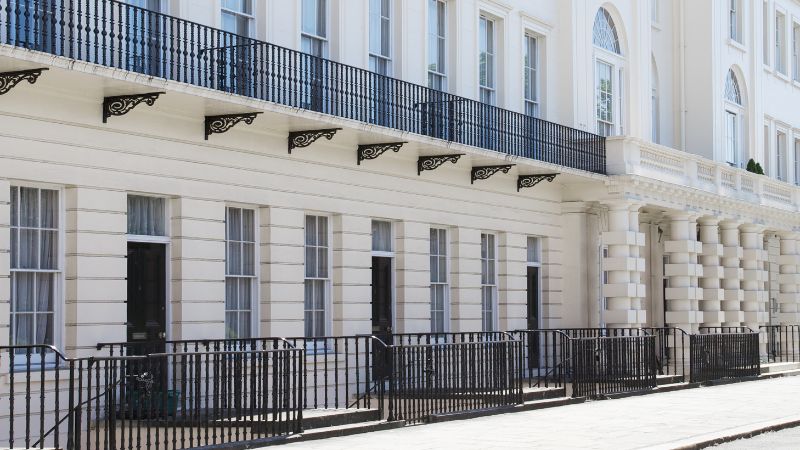Categories
Can I Buy a House in the UK from Abroad? | 2025 Insights

There are a lot of myths and misconceptions about buying a house in the UK from abroad. Is it possible? The answer is a resounding YES.
You might be a non-UK national looking to invest in the UK property market or an expat looking to buy property while you work overseas. Whatever your circumstances, there could be a variety of options available to you.
It's worth knowing that the British mortgage process is stringent. This is particularly true for high street lenders, who typically only deal with the most standard mortgage cases. While some mainstream lenders do offer international mortgage products, they usually won't offer the most competitive rates, and you'll be subject to strict eligibility criteria.
This is where having a clear idea of your options and being able to shop around can be a huge advantage. Even if you're not a UK resident, securing finance while living overseas is very much achievable.
Key Takeaways
- You don't need to be a resident to buy property in the UK.
- The mortgage process will be more complex if you're living overseas, but it is still possible.
- Some high street lenders do offer mortgages to non-UK residents.
- However, a specialist lender may be a more suitable route if you want to get the most affordable deal.
Our blog explores the ins and outs of international mortgage finance, the advantages of investing in the UK property market, and how to get the best terms on your mortgage. On top of that, there are ways to keep the process as stress-free as possible.
Related: How to Get a UK Mortgage When Living and Working Abroad
Skip to:
Can I buy a House in the UK from Abroad?
Who is Eligible for a UK Mortgage?
Can I Buy Property in the UK Without a Visa?
What is the British Property Market Like?
Has Buying Property in the UK Changed Since Brexit?
I’m a Foreign National Looking to Buy in the UK – What are the Tax Laws?
Will I get a Visa if I buy a House in the UK?
Which Banks Offer Overseas Mortgages?
Can I buy a House in the UK from Abroad?
Yes, it is possible to buy UK property while living abroad. Buying property in the UK while residing in another country isn't as uncommon as you might think. In fact, in 2024, nearly 200,000 properties in England and Wales belonged to non-UK residents. Buyers in Hong Kong have the biggest interest in UK property.
It's not difficult to buy property in the UK if you're paying cash. There aren't many regulations that would prevent you from buying a home in Britain outright, which likely fuels the consistent level of interest from overseas investors. But your trouble starts if you're looking to get a mortgage with living in an another country.
There are a number of lenders who may be willing to offer you a mortgage, but here are some of the primary challenges to be aware of:
-
UK Credit History - Lenders will assess you credit worthiness, and unfortunately, they will want to see that you have a credit footprint in the UK. If you live overseas, it's likely that this will be limited or non-existent. There are ways around this, but it does add a level of complexity to your application that will narrow down your pool of lenders.
-
Rates - Because you'll likely have less choice of lenders than with a standard mortgage application, mortgage providers will be less inclined to offer more competitive deals. With you being based overseas, there's an additional perceived level of risk to the lender, so they'll want to charge you a slightly higher rate to offset this risk.
-
Currency - If you live abroad, it's unlikely that you'll be earning in Pound Sterling. Because of this, lenders will usually shave off a portion of your salary to account for currency fluctuations, which will impact your affordability. Some currencies are viewed as more stable than others, however (US Dollar, for example, doesn't pose too much of a risk). There's typically a bit more room for flexibility with currencies that lender deals with often.
-
Verification - Being based abroad means that your paperwork will generally be more challenging for a UK mortgage provider to validate. From opposing time zones slowing the process down, to paperwork in different languages or differences in bureaucratic processes, there are a points in the process that can cause hiccups.
If you can prove you have some link to the UK, such as a British bank account or a relative that lives in the UK, the process ill be a bit easier. Otherwise, it's recommended to find a specialist lender that is familiar with more unique processes. In doing this, meeting the affordability requirements and having proof of stable income may be enough.
Working with an international mortgage broker can make this process a bit more streamlined. At Clifton Private Finance, we have long-term relationships with mainstream and private lenders, and we'll work on your behalf to make you with the most suitable deal.
New UK Banking Opportunity for Expats and Foreign Nationals
We now have an exclusive arrangement with a mainstream UK lender that enables expats and foreign nationals living abroad to open a UK bank account, even without UK residency or a visa. This significantly enhances access to UK mortgage products and improves chances of a successful application, even with other lenders' products for whole of market comparison.
Eligibility is limited to applicants from countries on the lender’s approved list. Please enquire for details and for how this may affect your own mortgage options.
Want more tips on securing a UK mortgage as an expat? Watch our video below:
Why Buy a House in the UK?
The UK property market is popular among investors due to its long-term growth potential and established legal framework. Property prices in certain areas, particularly major cities like London, have historically shown appreciation over time, making it an appealing investment option for both domestic and international investors.
To Diversify Your Investments
Investing in UK property allows individuals to diversify their investment portfolios beyond their home country's borders. Diversification can help spread risk and minimize exposure to economic fluctuations or political instability in a single market.
To Become a Landlord
Buying property in the UK with the intention of renting it out can provide a steady stream of rental income. Rental yields in certain areas, particularly in popular cities or university towns, can be attractive for investors seeking regular income from their investments.
A Holiday Home
Investing in UK property may provide opportunities for personal use, such as sending children to study at UK universities or enjoying vacations in the country. Owning a property in the UK can offer lifestyle benefits, including access to cultural attractions, historical sites, and vibrant city life.
The UK is often viewed as a stable and transparent market with strong legal protections for property rights. This perception of stability and adherence to the rule of law can attract investors seeking a safe haven for their capital.
See similar: The 9 Best Places to Live in the UK if You're an Expat
Find the Perfect Expat Mortgage

Who is Eligible for a UK Mortgage?
If you’re a cash buyer, there are few restrictions on buying UK property from overseas. But if you’re looking to secure finance, things get more complex.
Here's what mortgage lenders are going to look at in your mortgage application:
- Your income or projected rental income
- Your credit history
- Any significant outgoings or debt (such as another mortgage, car payments or children's school tuition)
- Proof of identification, address and employment (if it's a residential mortgage)
You don’t need British residency to secure mortgage finance, but it does help. And if you can prove you are a British resident, it’s likely the rates available will be a lot cheaper.
Expats: Having Ties to the UK Could Save You Money
It’s important to ensure you’re considered a UK expat before applying for a mortgage. If you’re still paying bills in the UK or living between the UK and a different country, you could still be eligible for a standard mortgage.
While additional complexities may exist, such as foreign earnings or an incomplete credit footprint, UK resident mortgages typically have cheaper rates than UK expat mortgages.
Can I Buy Property in the UK Without a Visa?
Yes, you can buy property in the UK without a visa. The UK has relatively open property ownership laws, allowing non-residents to purchase property in the country. However, there are some important considerations to keep in mind:
Residency Requirements
While there are no specific residency requirements for buying property in the UK, non-residents may face additional challenges when it comes to obtaining financing or dealing with legal and tax matters. Some lenders may have stricter criteria for non-resident borrowers, and legal and tax implications may vary based on residency status.
Foreign Ownership Regulations
Foreign buyers are subject to the same property ownership regulations and taxes as UK residents. However, there may be additional regulations or taxes for non-residents to consider, such as the Annual Tax on Enveloped Dwellings (ATED) for certain types of properties owned by non-natural persons.
Financing
Non-residents may find it more challenging to obtain financing for property purchases in the UK compared to UK residents. Some lenders may require larger deposits or have higher interest rates for non-resident borrowers. Additionally, non-residents may need to provide additional documentation to verify their income and financial stability.
Want more tips on securing a UK mortgage as a foreign national? Watch our short video below.
Find the Perfect Expat Mortgage
What is the British Property Market Like?
The UK might be small, but each region offers a rich and diverse experience, and this is reflected in the property market. It shows significant variation in terms of prices, demand, and supply. Major cities like London, Manchester, and Edinburgh typically have higher property prices and stronger demand compared to rural areas or smaller towns. However, there are pockets of high demand and price growth in various regions across the country. Cities like Oxford and Bristol aren't huge, but have increasingly high property values due to their good quality of life, quality of housing and access to desirable jobs.
Property prices in the UK have generally trended upwards over the long term, although there can be fluctuations in prices due to economic factors, government policies, and market sentiment. London, in particular, has seen significant price growth in recent decades, although price growth in the capital has moderated in recent years.
The UK has faced challenges with housing supply in recent years, particularly in areas of high demand such as London and the Southeast. Limited housing supply relative to demand has contributed to upward pressure on prices in many parts of the country. Efforts to increase housing supply through new construction and development projects are ongoing.
Buy-to-Let Market
You could purchase property to rent it out. Buy to lets are a key component of the UK property market due to consistently high demand. However, changes to tax regulations and government policies in recent years have affected the dynamics of the buy-to-let market, including changes to stamp duty rates and mortgage interest relief for landlords.
Property Prices in the UK
The average house price in the UK is around £268,000. However, this figure can vary significantly depending on the region.
For example, the average house price in London is significantly higher than the national average, typically exceeding £500,000. However, in northern regions of the UK, housing and overall cost of living are much more affordable. In Country Durham, the average sold price for property in 2023 was £143,788.
Has Buying Property in the UK Changed Since Brexit?
Buying property in the UK has experienced some changes since Brexit, primarily due to shifts in economic conditions and regulatory frameworks.
The Brexit referendum and subsequent negotiations created uncertainty in the UK economy and property market. Uncertainty surrounding trade agreements, immigration policies, and economic stability has influenced buyer and investor sentiment, leading to fluctuations in demand and prices.
What Regulations Have Changed?
Brexit has led to changes in residency and visa requirements for individuals moving to the UK from EU countries. Non-UK residents may face different rules and regulations regarding property ownership, residency, and taxation compared to EU citizens.

I’m a Foreign National Looking to Buy in the UK – What are the Tax Laws?
Stamp Duty Land Tax (SDLT)
SDLT is a tax paid on property transactions in the UK. Foreign buyers are subject to the same SDLT rates as UK residents. However, there may be additional surcharges for non-resident buyers. For example, non-residents purchasing residential property in England and Northern Ireland are subject to an additional 2% surcharge on top of the standard SDLT rates. This surcharge applies to purchases made on or after April 1, 2021.
Annual Tax on Enveloped Dwellings (ATED)
ATED is a tax paid by companies that own residential property in the UK valued above a certain threshold. Foreign companies owning UK residential property may be subject to ATED, which applies to properties held in corporate structures such as companies, partnerships, or collective investment schemes. The ATED rates vary depending on the value of the property.
Capital Gains Tax (CGT)
Capital Gains Tax is a tax on the profit made from selling assets, including property, in the UK. Foreign residents are generally subject to CGT on gains made from selling UK residential property. However, since April 2015, non-residents are also subject to CGT on gains made from selling UK residential property, subject to certain exemptions and reliefs.
Non-Resident Landlord Scheme (NRL)
Foreign landlords who rent out property in the UK may be subject to the Non-Resident Landlord Scheme. Under this scheme, tenants or letting agents are required to deduct basic rate income tax from rental payments and remit it to HM Revenue & Customs (HMRC) unless the landlord has successfully applied for approval to receive rental income gross.
Inheritance Tax (IHT)
Inheritance Tax is a tax on the estate (the property, money, and possessions) of someone who has died. Non-UK domiciled individuals may be subject to the UK Inheritance Tax on UK residential property they own, even if they are non-residents.
If you require more detailed info on the tax laws surrounding purchasing UK property while living overseas, it’s worth consulting a professional.
Will I get a Visa if I buy a House in the UK?
Unfortunately, buying property in the UK won’t provide you with Permanent Residence. The Tier 1 Investor visa previously granted individuals who invested over £10 million permanent residence, but this closed for applications in 2023. This means there is currently no way to immediately secure residency in Britain.
If you’re planning to buy a property with aims of relocating to the UK, here are some options:
-
Student & graduate visas
Which Banks Offer Overseas Mortgages?
While you may be eligible for an overseas mortgage with some high-street banks, they may not offer you the best options.
Specialist lenders are more accustomed to the unique circumstances associated with expat and foreign national cases. Whether it’s foreign currency earning, overseas assets, or little to no British credit footprint, these lenders can get a more accurate overview of your financial circumstances.
As an expat mortgage broker, we have relationships with high street and private banks, specialist lenders, family offices and wealth managers. We also have access to private investment funds.
Through our market knowledge, we can deliver enhanced, bespoke or exclusive terms based on your requirements.
Do you need to move faster to secure your dream home?
A bridging loan puts you in the position of a cash buyer, with short-term property finance available in as little as a few days. It’s then repaid when an ongoing sale completes, or when you secure a standard mortgage in its place.
You can use our free bridging loan calculator to get an indicative quote.
To see what options are available to you, call us on 0117 332 5391 or book an appointment below.









